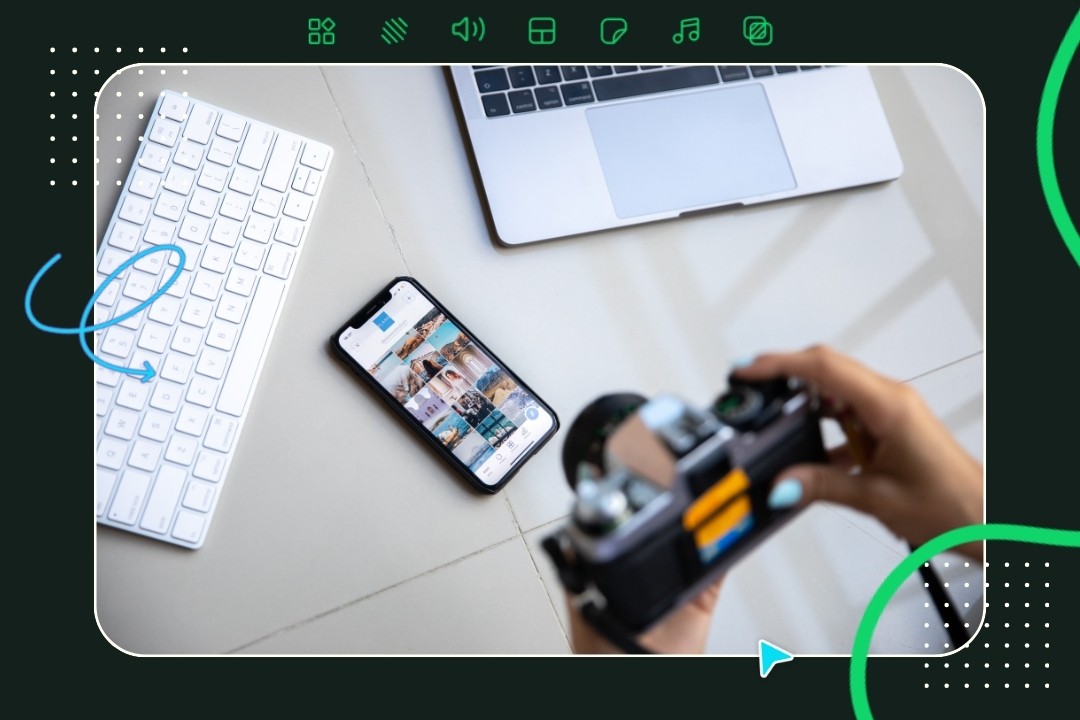Most of us know that stealing is bad, but on Instagram, people have been doing it (often unknowingly) since the app began in 2010.A quick Google search reveals that many brands encourage reposting as a way to grow your audience quickly. But the practice is under scrutiny after two massive social media marketers came under fire for reposting content from multiple creators on their business’ Instagram pages without permission from the original creators.Many Instagram users believe that as long as an account credits a creator when reposting the creator’s content to their feed, that should be enough. After all, you can share a post to your story, so what makes reposting to your feed any different?
Consent, Copyright, Compensation, and Community Guidelines
Manu Muraro, Laura Bitoiu, and Stephanie Gilbert, three of the entrepreneurs who recently had their content reposted by two competitors without permission, shared in an IG Live that the answer lies in consent, ethics, Instagram’s Terms of Use and Community Guidelines, copyright law, and a cross-platform cultural shift toward valuing creators for their work.
Compensating Creators: User Generated Content is Big MoneySince Instagram launched in 2010, the creator economy has ballooned from relative obscurity into an industry valued at $104 billion. In 2021, Instagram announced their $1B Creator Fund – an incentive program aimed at supporting and encouraging them to create original content for the platform by compensating them with “Reels bonuses”. And some creators are reporting potential earnings up to $35,000 USD if they can meet the milestones set by Instagram.With that much money on the line, it’s no surprise that those same creators’ are stepping up to protect their intellectual property and demand compensation for their work. In 2021, we saw Black TikTok go on strike and backlash when TikTok superstar Addison Rae was invited to perform dances on The Tonight Show with Jimmy Fallon that she didn’t create. Content rights and compensation continue to command conversation in 2022 as the Influencer and creator economy continues to grow. Influencer agency owners and advocates like Lissette Calveiro, Harley Jordan, Naomi Genota, and Sonia Elyss are championing fair compensation for influencers, as rates, negotiation, and gifted campaigns continue being a point of contention between many brands and creators.
A Rising Tide Lifts All Ships (Except It Doesn’t)While many creators don’t have a problem with larger accounts reposting their content, it often comes from the false assumption that a repost is going to benefit for the creator. However, most people working in social know that the reality is usually the opposite.The best case scenario is you get a few dozen new followers, but many times, a repost from a massive account can damage your account. If the account or celebrity isn’t aligned with your business and values, it can cause in an influx of followers who aren’t your ideal client. So while your follower account might go up, your new followers aren’t as likely to be genuinely interested in your content. This can cause your engagement rate to drop, and make it harder for Instagram’s algorithm to identify patterns via signals from your followers to predict who to show your content to.Meanwhile, the account that reposted your content often markets their own products or services with content someone else worked hard to produce, without permission, compensation, and sometimes even proper credit. This isn’t fair to creators, but it’s especially unethical when the perpetrators are multi-million-dollar businesses. Getting permission is the bare minimum.
Credit, Copyright, and Instagram’s Community Guidelines When you sign up for Instagram—regardless of your account type—you agree to their Terms of Use and Community Guidelines. The problem is, most people don’t read them. They explicitly state that by using Instagram you agree to “Share only photos and videos that you’ve taken or have the right to share.” Instagram goes on to tell users: “don’t post anything you’ve copied or collected from the Internet that you don’t have the right to post.”You don’t need to register your work with the Copyright Office to be protected. Kelli Jones, a Trademark and Business Lawyer, said in a comment on the post discussing the mass copyright infringement, “You can file a DMCA takedown notice through Instagram for any content you’ve created - regardless of whether you actually registered the copyright. You own the copyright to your content as soon as it is created and uploaded to social media.”Anyone who owns the right to a photo, video, graphic, or even trending sound, can file a copyright infringement report via Instagram’s Help Center, if the content isn’t properly attributed. If Instagram finds that the content was posted without permission from the copyright owner, the content will be removed and your account will receive a violation. Even if you gave them credit, included a disclaimer that you didn’t intend to infringe copyright, or reposted the content from someone else who had permission to share it.And if you receive several violations, it can result in your account being temporarily or permanently deactivated.Over the next few days after Manu, Laura, Stephanie and others realized their content was posted without their permission, almost 400 posts were removed from the two accounts, according to the social media analytics site, Social Blade. Cassie, an artist and trending sound creator on TikTok, recently filed a copyright infringement report for her viral sound after one of her customers sent her a DM of another account using it without crediting her. The person downloaded their own TikTok video using Cassie’s sound, but didn’t add the sound back onto the video from Cassie’s Instagram account in the Reels editor. Instagram decided in her favor and the sound was muted from over Instagram 4,000 videos that used the sound in their own Reels.
Reposting and Protecting Your ContentIf you still feel the need to repost content from other creators, make sure you receive explicit written permission first. But even if you follow all the rules, you still may want to reconsider. The Head of Instagram, Adam Mosseri, shared a video on April 22, 2022 announcing that Instagram is changing the way they rank reposted content. “If you create something from scratch, you should get more credit than if you are resharing from something you found from someone else,” he said, We’re going to do more to value original content.”While it’s unclear how exactly Instagram plans to implement this, whether it’s by using the in-app reels editor, facial recognition, or something else, it’s a breath of fresh air for creators to hear the people at the top finally prioritizing giving them the credit and recognition they deserve.
If you’re worried about your content being reposted without permission, Slate makes it easy to watermark and protect your content so it’s easier to identify and track down on social.
Want to see slate in action?






